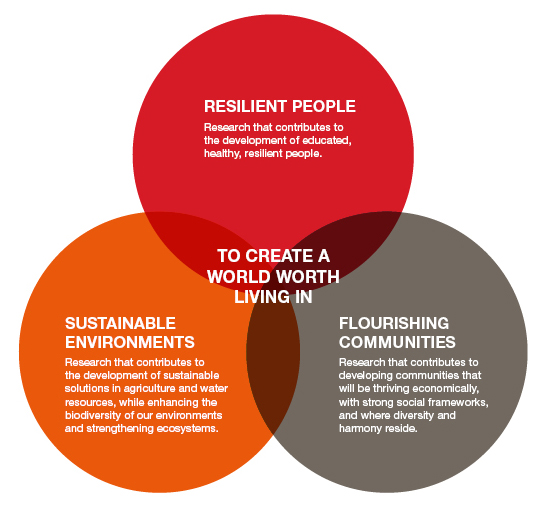Research at Charles Sturt University changes lives. From individuals and communities to national projects and international collaborations, our research focuses on the ability of collaboration to make the world a better place.
We do this by focusing on three key areas:
- resilient people
- sustainable environments
- flourishing communities.
Taking research into communities
One of the ways that we put these aims into action is by combining our research expertise with local business knowledge in order to drive innovation and expand the horizons of regional enterprises.
Professor in entrepreneurship at Charles Sturt University, Morgan Miles, explained how this taps into major shifts in government focus.
“Mostly what I do is working with small business and start up – and the start-up industry in Australia, and particularly in New South Wales where the majority of our campuses are located, is booming at the moment. There is major government investment in entrepreneurial programs, and incubators and accelerators that support entrepreneurs and innovators are becoming much more prevalent.
“For example, in Orange, near Charles Sturt University’s campus there, is the GATE [Global Ag-Tech Ecosystem] Innovation Centre at NSW Department of Primary Industries’ Orange Agricultural Institute. This serves to fast-track research and development, to get new ideas, technologies and services into the hands of our producers and industry to boost productivity.
“The university has links to GATE, but we are also working with industries in our own accelerator programs to combine our research expertise with local business knowledge.”
Charles Sturt University has three dedicated hubs to promote innovation in our regions.
- Walan Mayinygu Indigenous Entrepreneurship Pop Up Hub Program
- AgriTech Incubator Hub
- CenWest Innovate
The Walan Mayinygu Pop Up Hub Program is a roaming enterprise that provides business workshops and networking to Aboriginal and Torres Strait Islander people, particularly those in remote locations, to help them establish successful small businesses. The AgriTech Incubator Hub supports small- and medium-sized enterprises to overcome research and development challenges, while also fostering greater participation of women in entrepreneurial activities. And CenWest Innovate encourages interaction between the university and local small businesses to build regional business innovation and job growth.
Established centres of research
The university also established a number of designated research centres. These concentrate research expertise and allow academics, research students and local organisations to collaborate on projects.
The Graham Centre for Agricultural Innovation is a collaborative alliance between Charles Sturt and the NSW Department of Primary Industries. Its aims include increasing the profitability of the grain and livestock industries while protecting natural resource degradation and supporting a sustainable economic future for agriculture on regional, national and international levels.
For instance, Charles Sturt University partnered in EverGraze – a national research, development and extension project – to research how livestock enterprises could make management decisions about when, where and how to use perennial plants to increase productivity and profitability, while also looking after the sustainability and resilience of the land. And our researchers have undertaken research to support the Chinese Government to restore nearly 400 million hectares of degraded grasslands to not only protect the environmental resources, but also bring economic and social benefits for herders whose livelihoods depend on the land.
The National Wine and Grape Industry Centre is a collaborative alliance between Charles Sturt University, the NSW Department of Primary Industries and the NSW Wine Industry Association that seeks to improve wine production and enhance wine business success in our regions, as well as collaborate with transnational wine organisations to foster innovation in the industry. Its research focuses on grape and wine science, plant pathology, vine physiology, fruit development, fruit and wine composition, sensory characteristics of wine and consumer preference. For instance, researchers have worked on breeding vines that are resistant to funguses, so that the use of chemical fungicides in vineyards can be reduced.
The Institute for Land, Water and Society conducts research in social and environmental sustainability. Research themes include biodiversity, climate change, energy use, natural resource management, sustainable water use, regional development, rural social issues, Indigenous business and cultural heritage. Recent projects include training Aboriginal communities in environmental monitoring and devising environmentally sustainable irrigation solutions for the Murray–Darling Basin.
The Centre for Public and Contextual Theology focuses on areas such as faiths and culture, theory and praxis in public and contextual theology, religion and society, and scripture and social ethics. For example, the centre is collaborating with our Centre for Islamic Studies and Civilisation to research areas such as religious instruction in schools and the prevalence of Islamophobia.
Create a better future
If you have an idea that will push the boundaries of knowledge forward and help create a world worth living in, Charles Sturt University is the place to explore it. Our broad range of Higher Degrees by Research allow you to explore your area of interest, while backed by expert academics, industry links and dedicated support staff.
Start shaping the future now.



You must be logged in to post a comment.